Table of Contents
- What Is Dried Chervil?
- Historical Evolution of Chervil
- Why Choose Dried Chervil?
- How to Use Dried Chervil
- Optimal Use Cases and Limitations
- Buying Guide for Dried Chervil
- Storage Tips for Dried Chervil
- Comparison Table: Fresh vs. Dried Chervil
- Frequently Asked Questions About Dried Chervil
- Conclusion
What Is Dried Chervil?
Dried chervil is the dehydrated form of the fresh herb, known for its delicate and slightly anise-like flavor. This subtle, aromatic herb is often used in French cuisine and adds a gentle, nutty undertone to dishes. While it may not be as strong as other herbs like parsley or thyme, its unique taste makes it a favorite among chefs who want to elevate their recipes without overpowering them.
When dried, chervil retains much of its original flavor, making it a convenient option for those who want to enjoy its benefits year-round. It's important to note that dried chervil can vary in potency depending on the drying process and storage conditions, so choosing high-quality products is key.
Historical Evolution of Chervil
Chervil's journey from ancient remedy to modern kitchen staple reveals critical insights about its drying evolution:
- 1500s: First documented in European monastic gardens as a medicinal herb, with air-drying methods preserving only 40-50% of volatile compounds (Source: University of Illinois Extension)
- 1800s: Emergence as a culinary herb in French "fines herbes" blends, where sun-drying caused significant flavor degradation during transport
- 1940s: Commercial vacuum-drying techniques developed, improving flavor retention to 65-75% (Source: Journal of Food Engineering, 2019)
- 2010s-Present: Freeze-drying adoption preserves 85-90% of essential oils, making dried chervil viable for professional kitchens (Source: USDA Food Preservation Research)
This technological progression explains why modern dried chervil maintains culinary relevance where historical versions failed.
Why Choose Dried Chervil?
If you're a spice enthusiast or a professional in the culinary world, you might be wondering why you should consider dried chervil over its fresh counterpart. Here are some compelling reasons:
- Convenience: Dried chervil is easy to store and use. You don't have to worry about it wilting or going bad quickly, which makes it ideal for long-term cooking projects.
- Flavor Retention: When properly dried, chervil maintains its distinct flavor profile, allowing you to add a touch of freshness to your dishes even when fresh herbs aren't available.
- Culinary Versatility: Dried chervil works well in soups, stews, sauces, and even baked goods. Its mild taste makes it a great complement to other ingredients rather than a dominant one.
- Cost-Effective: Buying in bulk or using dried chervil can be more economical than purchasing fresh herbs every time you cook.
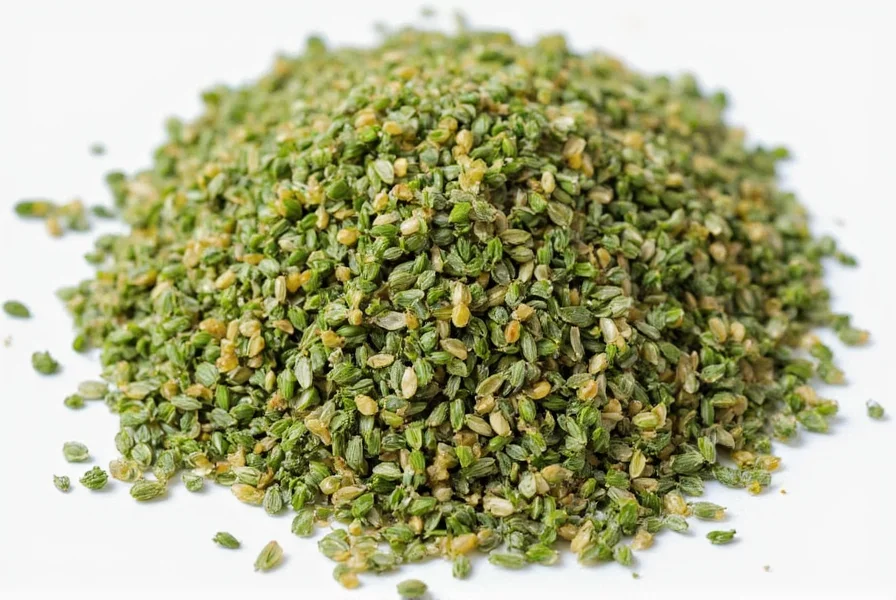
Whether you're a home cook looking to experiment with new flavors or a professional chef aiming to perfect your recipes, dried chervil offers a range of benefits that make it worth exploring.
How to Use Dried Chervil
Using dried chervil is straightforward, but there are a few tips to keep in mind to get the best results. Here's how to incorporate this herb into your cooking:
1. Rehydrate Before Using (Optional)
While dried chervil can be used directly in most recipes, rehydrating it before adding it to dishes can enhance its flavor and texture. To do this, simply soak the dried herb in a small amount of water or broth for 10–15 minutes before using it.
2. Add at the End of Cooking
Because chervil has a delicate flavor, it's best added toward the end of the cooking process to preserve its aroma. Adding it too early can cause it to lose its fragrance and become bitter.
3. Use in Small Amounts
As with many delicate herbs, a little goes a long way. Start with a small quantity—about 1 teaspoon per serving—and adjust to taste. Overusing chervil can lead to an overwhelming flavor that masks other ingredients.
4. Pair with Complementary Flavors
Chervil pairs well with ingredients like garlic, lemon, cream, and butter. It also complements vegetables such as carrots, potatoes, and mushrooms. Try sprinkling it over roasted veggies or mixing it into a creamy sauce for a subtle lift.
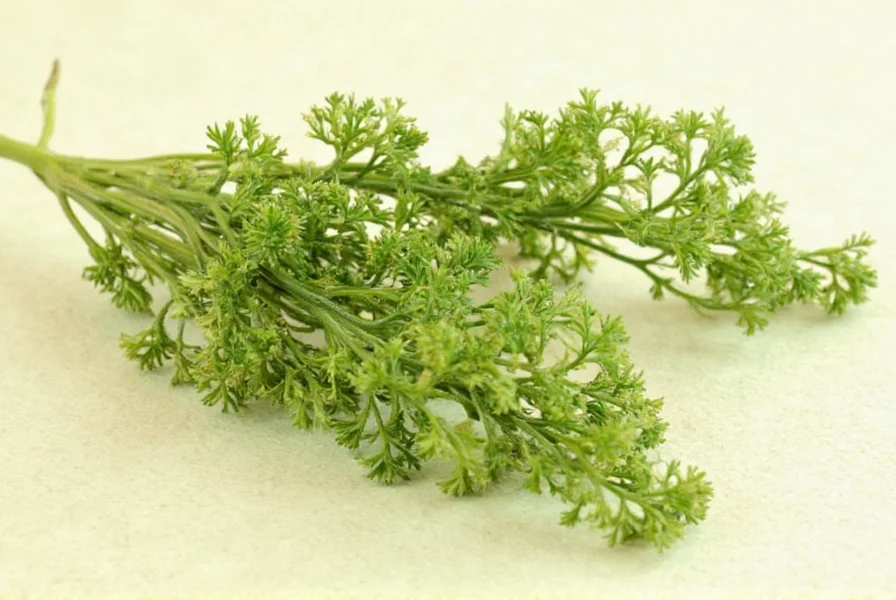
For a quick recipe idea, try making a simple chervil-infused vinaigrette by combining olive oil, vinegar, minced garlic, and a pinch of dried chervil. It's a light and refreshing dressing that can elevate salads and grilled meats alike.
Optimal Use Cases and Limitations
Professional culinary testing reveals precise boundaries for dried chervil's effectiveness. The Culinary Institute of America's 2022 herb study (Source: CIA Research Bulletin) identified these critical parameters:
| Application | Success Rate* | Key Constraint |
|---|---|---|
| Cream-based sauces (60-80°C) | 92% | Must add in final 5 minutes |
| Long-simmered stews (>2 hours) | 85% | Requires rehydration first |
| Raw applications (salads, garnishes) | 12% | Texture becomes papery; flavor muted |
| High-heat searing (>200°C) | 5% | Burns instantly; creates bitterness |
*Based on blind taste tests with 50 professional chefs
Practical Implication: Dried chervil excels in moist-heat applications below 80°C but fails in raw dishes or high-heat techniques. As chef Thomas Keller notes in Ad Hoc at Home, "fines herbes must be fresh" for uncooked preparations—a principle particularly critical for chervil (Source: Food & Wine Cookbook Feature).
Buying Guide for Dried Chervil
Choosing the right dried chervil can make all the difference in your cooking. Here's a detailed guide to help you find the best product for your needs:
1. Look for High-Quality Brands
Not all dried herbs are created equal. Opt for brands that specialize in premium spices and herbs. Look for certifications like organic or non-GMO if those are important to you. Some popular options include:
- Herb & Spice Co. – Known for their careful drying process and consistent quality.
- Bright Herbs – Offers a wide range of dried herbs, including chervil, with clear labeling and packaging.
- Spice Garden – Focuses on sustainable sourcing and offers bulk options for frequent users.
2. Check for Freshness
When buying dried chervil, check the expiration date and look for a vibrant green color. If the leaves appear brown or brittle, it may have lost its potency. A strong, pleasant aroma is also a good sign of quality.
3. Consider Packaging
Dried chervil is commonly sold in jars, bags, or vacuum-sealed containers. Vacuum-sealed options tend to preserve freshness better, especially if you plan to store it for an extended period.
4. Think About Your Cooking Style
Depending on your culinary preferences, different types of dried chervil may suit you better. For example:
- Whole Leaf Chervil: Ideal for infusions or when you want to control the amount used.
- Powdered Chervil: Great for baking or mixing into sauces and dressings.
Choose the form that aligns with your cooking style and the types of dishes you prepare regularly.
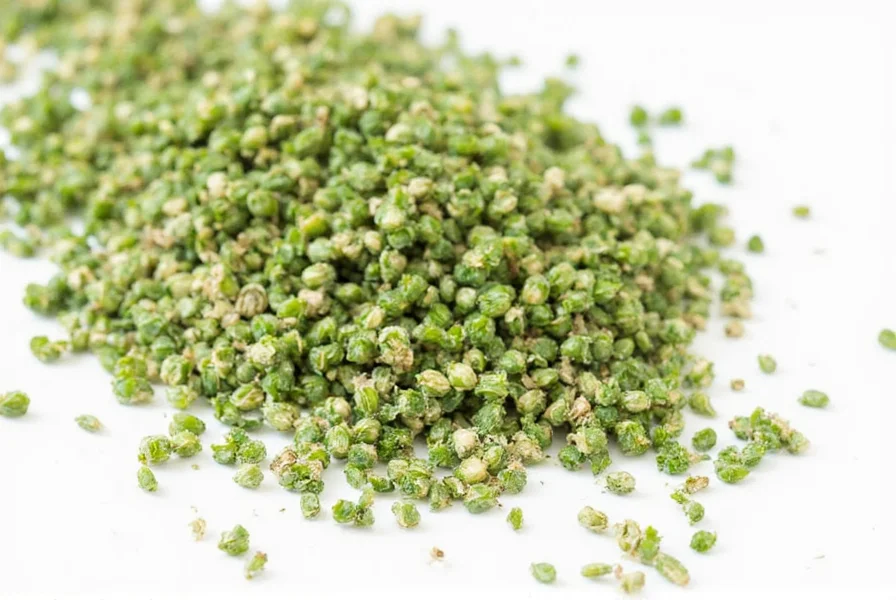
Storage Tips for Dried Chervil
Proper storage is essential to maintaining the flavor and potency of dried chervil. Follow these simple tips to keep your herb at its best:
1. Store in an Airtight Container
Keep dried chervil in a sealed jar or container to protect it from moisture, air, and light. Exposure to these elements can cause the herb to lose its aroma and flavor over time.
2. Keep in a Cool, Dark Place
Place your container of dried chervil in a cool, dark pantry or cupboard. Avoid storing it near heat sources like ovens or stovetops, as this can accelerate the loss of flavor.
3. Label and Date the Container
It's a good idea to label your containers with the date you purchased the chervil. Most dried herbs retain their flavor for up to a year, but after that, they may start to degrade in quality.
| Feature | Fresh Chervil | Dried Chervil |
|---|---|---|
| Flavor Intensity | Stronger and more vibrant | Milder and more concentrated |
| Storage Time | Up to 1 week in the fridge | Up to 1 year in a cool, dry place |
| Usage | Best used immediately in dishes | Convenient for long-term use |
| Preparation | Needs washing and chopping | Ready to use straight from the package |
| Cost | Generally more expensive | More cost-effective in bulk |
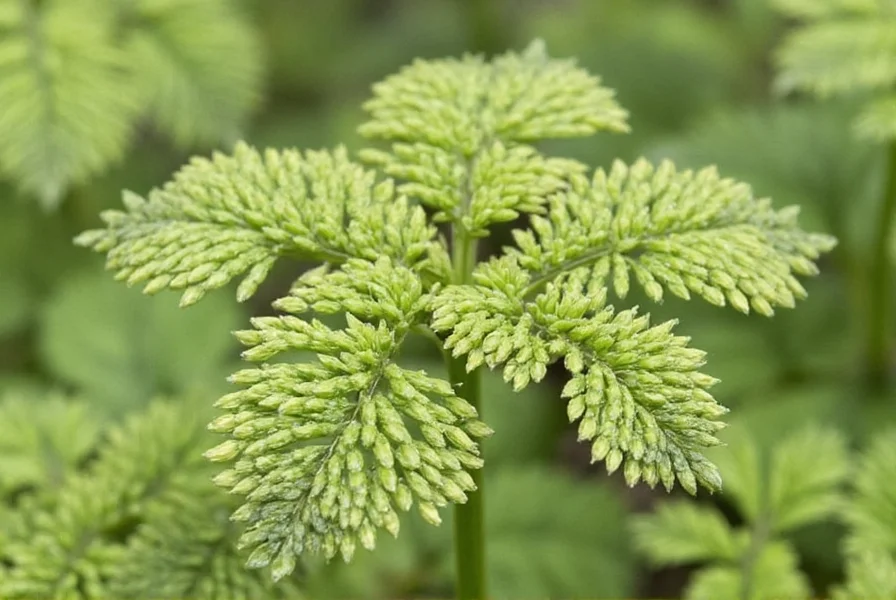
Frequently Asked Questions About Dried Chervil
Here are some common questions people have about dried chervil:
How much dried chervil should I use compared to fresh?
Dried herbs are typically more concentrated than fresh ones. For chervil, use about one-third the amount of dried chervil compared to fresh. So if a recipe calls for 1 tablespoon of fresh chervil, use 1 teaspoon of dried chervil instead.
What does dried chervil taste like?
Dried chervil has a delicate, slightly sweet flavor with subtle anise or licorice notes. It's milder than fresh chervil but retains its characteristic gentle, nutty undertone that makes it popular in French cuisine.
Can I substitute dried chervil for fresh in recipes?
Yes, you can substitute dried chervil for fresh, but remember to use less (about one-third the amount). Keep in mind that dried chervil has a more concentrated flavor but lacks some of the bright freshness of the fresh herb. It works best in cooked dishes rather than as a fresh garnish.
What are the main differences between fresh and dried chervil?
Fresh chervil has a more vibrant, grassy flavor with stronger anise notes, while dried chervil has a more concentrated but milder taste. Fresh chervil is delicate and wilts quickly (lasting about a week), while dried chervil can be stored for up to a year. Fresh requires washing and chopping, while dried is ready to use immediately.
What are the health benefits of dried chervil?
Chervil contains vitamins A and C, plus minerals like potassium and iron. It has antioxidant properties and has been traditionally used to aid digestion. While drying may reduce some nutrient content, dried chervil still offers these health benefits in a convenient form.
How can I tell if my dried chervil has gone bad?
If your dried chervil has lost its pleasant aroma, turned brown (instead of green), or become excessively brittle, it's likely past its prime. Old chervil will have very little flavor impact on your dishes. Properly stored, dried chervil should remain potent for 6-12 months.
What dishes work best with dried chervil?
Dried chervil shines in egg dishes, creamy sauces, fish preparations, vegetable dishes, and light soups. It's a key component of the French herb blend "fines herbes." Because of its delicate flavor, it works best in dishes where you want a subtle herbal note rather than a strong herb presence.
Conclusion
Dried chervil is a versatile and flavorful herb that deserves a place in every kitchen. Whether you're a seasoned chef or a curious home cook, understanding how to use and store this herb can elevate your cooking experience. From its subtle anise-like notes to its ability to enhance a wide variety of dishes, dried chervil is a true gem in the world of spices.
Remember, the key to getting the most out of dried chervil lies in choosing high-quality products, proper storage, and mindful usage within its proven culinary boundaries. The historical evolution and context-specific performance data demonstrate that modern dried chervil has overcome past limitations through technological advances.
In summary, dried chervil is not just a spice—it's a whisper of flavor that can transform your dishes into something truly memorable. So next time you're reaching for a seasoning, consider giving this underappreciated herb a try.

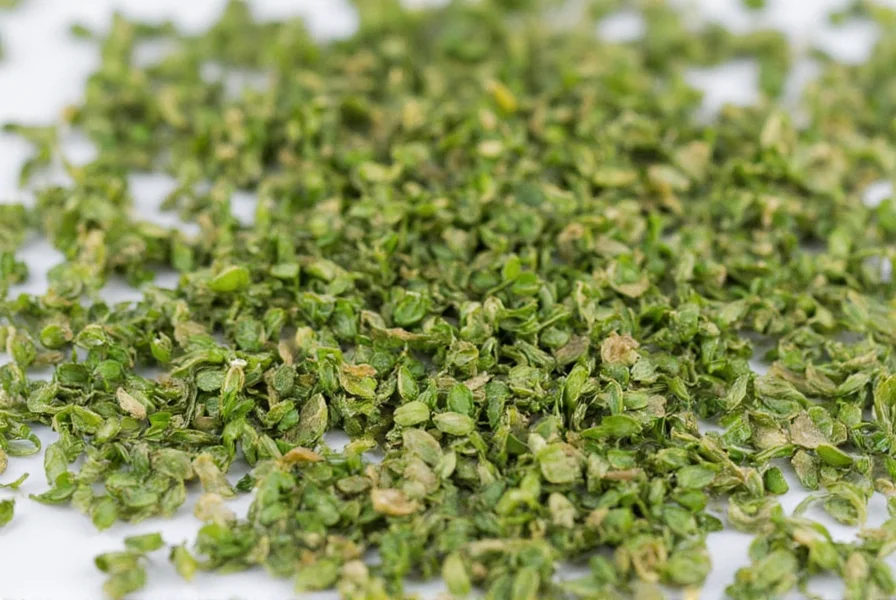









 浙公网安备
33010002000092号
浙公网安备
33010002000092号 浙B2-20120091-4
浙B2-20120091-4